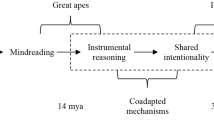Abstract
The general aim of this work is to show the importance of the adressee's mind as planned by the author of a speech act or of a norm; in particular, how important are the expected motivations for goal adoption. We show that speech acts differ from one another for the different motivations the speaker is attempting to obtain from the hearer. The description of the participants' social positions is not sufficient. Important conflicts can arise which are not relative to what to do, but to the different motives requested by the speaker. This view is applied to norms, pointing out that what is required by a norm is not only a behaviour but also a mental attitude, and that the prescribed mind might be even more important than the prescribed behaviour. Norms don't want just behavioural conformity, but also that this conformity implies an acknowledgement and a reinforcement of both the authority and the norm itself. Norms ask for submission. Any form of norm is aimed at influencing the addressee by changing his or her mind.
Similar content being viewed by others
References
Allen, J.F. & Perrault, C.R. (1980). Analysing Intention in Utterances. Artificial Intelligence, 15, 143-78.
Brassac, C. (1994). Theorie des actes de langage et intelligence artificielle distributee. TR Mai 1994, Universite' de Nancy II, Groupe de Recherche sur les Communications.
Castelfranchi, C. (1992). No More Cooperation Please! In search of the Social Structure of Verbal Interaction. In Ortony, A., Slack, J., and Stock, O. (eds.) Communication from an Artificial Intelligence Perspective, Heidelberg, Germany: Springer, 206-227.
Castelfranchi, C. (1995). Commitment: from intentions to groups and organizations. In Proceedings of ICMAS'95, San Francisco, June 1995, AAAI-MIT Press.
Castelfranchi, C., Falcone, R. (1997). Delegation Conflicts, in M. Boman & W. van de Velde (eds.) Multi-Agent Rationality, Lecture Notes in Artificial Intelligence, 1237. Springer-Verlag, pp. 234-254, 1997.
Castelfranchi, C. & Parisi, D. (1980). Linguaggio, conoscenze e scopi. Il Mulino, Bologna.
Cohen, P.R. & Perrault, C.R. (1979). Elements of a plan-based theory of speech acts. Cognitive Science, 3, 177-212.
Cohen, P.R. & Levesque, H.J. (1985). Speech Acts and Rationality. TR, CSLI, Standford University.
Conte, R. & Castelfranchi, C. (1993). Norms as mental objects. From normative beliefs to normative goals. In Preproceedings of the AAAI Spring Symposium on “Reasoning about Mental States: Formal Theories & Applications”, AAAI, Stanford, CA, March 23–25.
Conte, R. & Castelfranchi, C. (1995). Cognitive and Social Action. London: UCL press.
Conte, R. & Castelfranchi, C. (1995b). The treatment of norms in modelling rational agents: cognitive issues. ModelAge, 22–24 January 1995, INRIA, Sophia Antipolis.
Dignum, F. & van Linder, B. (1997). Modeling Social Agents: Communication as Action. In J. Mueller, M. Wooldridge & N. Jennings (eds.) Intelligent Agents III, Heidelberg, Springer, LNAI 1193, pp. 205-18.
Grice, H.P. (1957). Meaning, in “Phylosophical Review” LXVI, pp. 377-88.
Habermas, J. (1981). Theorie des kommunikativen Handelns. Vol. I, Suhrkamp, Frankfurt am Main.
Hart, H.L. (1961). The concept of law, Oxford: Oxford University Press.
Jones, A.J. & Pörn, I. (1985). Ideality, sub-ideality and deontic logic. Synthese 65: 295-318.
Jones, A.J.I. & Sergot, M. (1996). A Formal Characterisation of Institutionalised Power. Journal of the Interest Group in Pure and Applied Logics, 4(3): 427-45.
Levinson, S.C. (1981). The essential inadequacies of speech act models od dialogue. In Parret, H., Sbisa', M. & Verschueren J. (eds.) 1981. Possibilities and Limitations of Pragmatics. Amsterdam: John Benjamins, 473-92.
Moulin, B. (1997). The social dimension of communicative actions in multiagent systems, Laval University, Computer Science Department, TR.
Parisi D. & Castelfranchi, C. (1976). Discourse as a hierarchy of goals. Documents de Travail, n. 54-55, Centro di Semiotica, Universita' di Urbino, Urbino.
Parisi D. & Castelfranchi, C. (1981). A Goal Analysis of Some Pragmatic Aspects of Language. In Parret, H., Sbisa', M. & Verschueren J. (eds.) 1981. Possibilities and Limitations of Pragmatics. Amsterdam: John Benjamins.
Pörn, I. (1989). On the Nature of a Social Order. In J.E. Festand et al. (eds.) Logic, Methodology and Philosophy of Science, North-Holland: Elsevier, 553-67.
Ross, A. (1958). On Law and Justice. London: Steven & Sons.
Searle, J. R. (1969). Speech Acts. Cambridge: Cambridge University Press.
Searle, J.R. & Vanderveken, D. (1985). Foundations of Illocutionary Logic, Cambridge University Press.
Sergot, M. & Jones A., (1995). Norm-Governed and Institutionalised Agent Interaction. ModelAge, 22–24 January 1995, INRIA, Sophia Antipolis.
Sycara, K. (1989). Argumentation: Planning Other Agents' Plans. In Proceeding of the 11th International Joint Conference on Artificial Intelligence. Morgan Kaufmann, San Mateo, CA
Trognon, A. & Brassac, C. (1993). Formalizing the theory of intentionality. Journal of Pragmatics.
Author information
Authors and Affiliations
Rights and permissions
About this article
Cite this article
Castelfranchi, C. Prescribed mental attitudes in goal-adoption and norm-adoption. Artificial Intelligence and Law 7, 37–50 (1999). https://doi.org/10.1023/A:1008363413485
Issue Date:
DOI: https://doi.org/10.1023/A:1008363413485




